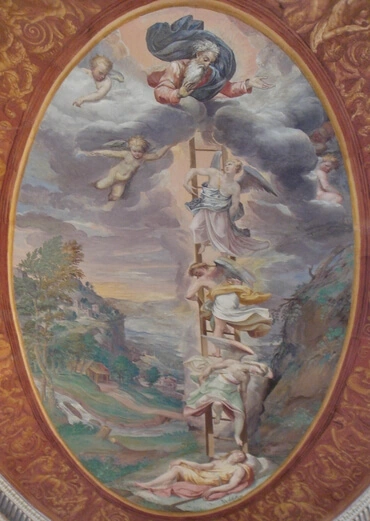1
Und Jehova sprach zu Abram: Gehe aus deinem Lande und aus deiner Verwandtschaft und aus deines Vaters Hause, in das Land, das ich dir zeigen werde.
2
Und ich will dich zu einer großen Nation machen und dich segnen, und ich will deinen Namen groß machen; und du sollst ein Segen sein!
3
Und ich will segnen, die dich segnen, und wer dir flucht, den werde ich verfluchen; und in dir sollen gesegnet werden alle Geschlechter der Erde!
4
Und Abram ging hin, wie Jehova zu ihm geredet hatte, und Lot ging mit ihm; und Abram war 75 Jahre alt, als er aus Haran zog.
5
Und Abram nahm Sarai, sein Weib, und Lot, seines Bruders Sohn, und alle ihre Habe, die sie erworben, und die Seelen, die sie in Haran gewonnen hatten, und sie zogen aus, um in das Land Kanaan zu gehen; und sie kamen in das Land Kanaan.
6
Und Abram durchzog das Land bis zu dem Orte Sichem, bis zur Terebinthe Mores. Und die Kanaaniter waren damals im Lande.
7
Und Jehova erschien dem Abram und sprach: Deinem Samen will ich dieses Land geben. Und er baute daselbst Jehova, der ihm erschienen war, einen Altar.
8
Und er brach auf von dannen nach dem Gebirge ostwärts von Bethel und schlug sein Zelt auf, Bethel gegen Westen und Ai gegen Osten; und er baute daselbst Jehova einen Altar und rief den Namen Jehovas an.
9
Und Abram zog fort, immer weiter ziehend, nach dem Süden. (Das hebräische Wort bezeichnet die Südgegend von Palästina)
10
Es entstand aber eine Hungersnot im Lande; und Abram zog nach Ägypten hinab, um sich daselbst aufzuhalten, (O. um daselbst als Fremdling zu weilen, d. h. ohne ansässig zu werden; vergl. Kap. 19,9;20,1;21,23 und viele and. Stellen) denn die Hungersnot war schwer im Lande.
11
Und es geschah, als er nahe daran war, nach Ägypten zu kommen, da sprach er zu Sarai, seinem Weibe: Siehe doch, ich weiß, daß du ein Weib, schön von Ansehen, bist;
12
und es wird geschehen, wenn die Ägypter dich sehen, so werden sie sagen: Sie ist sein Weib; und sie werden mich erschlagen und dich leben lassen.
13
Sage doch, du seiest meine Schwester, auf daß es mir wohlgehe um deinetwillen und meine Seele am Leben bleibe deinethalben.
14
Und es geschah, als Abram in Ägypten ankam, da sahen die Ägypter, daß das Weib sehr schön war.
15
Und die Fürsten des Pharao sahen sie und priesen sie dem Pharao; und das Weib wurde in das Haus des Pharao geholt.
16
Und er tat Abram Gutes um ihretwillen; und er bekam Kleinvieh und
inder und Esel und Knechte und Mägde und Eselinnen und Kamele.
17
Und Jehova schlug den Pharao und sein Haus mit großen Plagen um Sarais willen, des Weibes Abrams.
18
Und der Pharao ließ Abram rufen und sprach: Was hast du mir da getan? Warum hast du mir nicht kundgetan, daß sie dein Weib ist?
19
Warum hast du gesagt: Sie ist meine Schwester, so daß ich sie mir zum Weibe nahm? Und nun siehe, da ist dein Weib, nimm sie und gehe hin.
20
Und der Pharao entbot seinetwegen Männer, und sie geleiteten ihn und sein Weib und alles, was er hatte.







